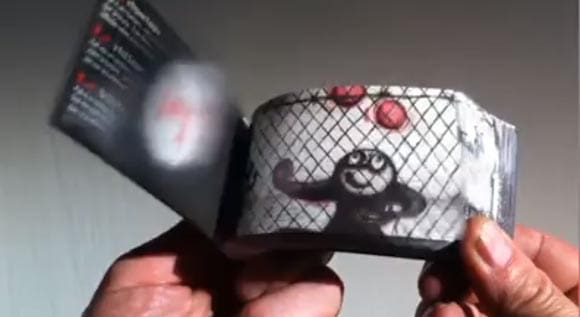As part of our yearlong LSTA/IMLS grant funded Movie Maker project at the East Lyme Public Library, we recently hosted a flipbook workshop series for tweens. Why flipbooks? When we were planning the roster of programs for the year, I contacted local filmmakers for creative ideas. Multimedia artist Ian Applegate immediately suggested teaching the tweens how to make flipbooks. Since I had never heard of flipbooks, I asked Ian a few questions:
What is a flipbook?
A flipbook is any hand-drawn animation containing pages of drawings which are slightly different from one another which gives the effect of a motion picture. It’s one of the only ways to produce the illusion of moving objects without the use of electronic devices.
What made you decide to make flipbooks?
I needed a way to take the computer animation program known as Adobe Flash and explain it to students without access to computers.
How do kids react to flipbooks? Are they excited to make their own?
Generally, kids and adults are immediately impressed by the smoothness of the animations which I highlight and feature to demonstrate the skills that I teach. Then they become overwhelmed and concerned by the process of developing the skills involved. My goal is to teach the acceptance that learning a skill is an investment of time. It’s just as important as the skill itself, because patience is transferrable to many other trades, even interpersonal skills, in life.
How do flipbooks promote STEM and STEAM education?
Flipbooks are the “A” in “Steam,” but they’re also the science in that the way that I teach flipbooks alludes to computer science in terminology. As far as technology, it’s “retro” in that it’s a bygone application for something which most people would easily recommend an “app” to make, particularly animations, yet the flipbook itself is a physical object, made of paper, not a work of software or a saved file. Creating a flipbook from scratch means utilizing a process which would be considered engineering. Mathematically, you can “program” physics equations in terms of bouncing objects, spinning things, and many other visualizations of formulas by varying the distance between objects based on specific equations.



The flipbook workshops were a smash hit with the tweens. We had perfect attendance all three days. I was pleasantly surprised to see that the program involved more than just STEAM skills. It actually became what I like to call a STREAM (Science, Technology, READING, Engineering, Art, and Math) program. The workshops elicited more reading tie-ins than I had expected. For example, one of the tweens asked if I had any pictures of birds he could copy. I retrieved Sibley’s Book of Birds as well as a few other basic birding books. Soon there were books sprawled all over the table as the other kids requested illustrated books of frogs, insects, dogs, and horses. After the program, many of the participants checked out field guides, graphic novels, books about cartooning, and more.
To see examples of flipbooks and to learn more about this art form, visit flipbookisland.com.
Multimedia artist, Ian Applegate lives and works in New Haven, Connecticut. As part of Yale University’s Splash program, he has taught animation at schools throughout New Haven. He can be reached at [email protected].
The East Lyme Public Library Movie Maker project is made possible in part by the Institute of Museum and Library Services under the provisions of the Library Services and Technology Act, administered by the Connecticut State Library. Funds have also been provided by the East Lyme Public Library through its Annual Fund Drive.
(Photos courtesy guest blogger)
********************************************************************
Our guest blogger is Rebecca Scotka. Rebecca is the Children’s and Young Adult Librarian at the East Lyme Public Library in Connecticut. She can be reached at [email protected].
Please note that as a guest post, the views expressed here do not represent the official position of ALA or ALSC.
If you’d like to write a guest post for the ALSC Blog, please contact Mary Voors, ALSC Blog manager, at [email protected].
The post Unplugged Movie Making appeared first on ALSC Blog.




